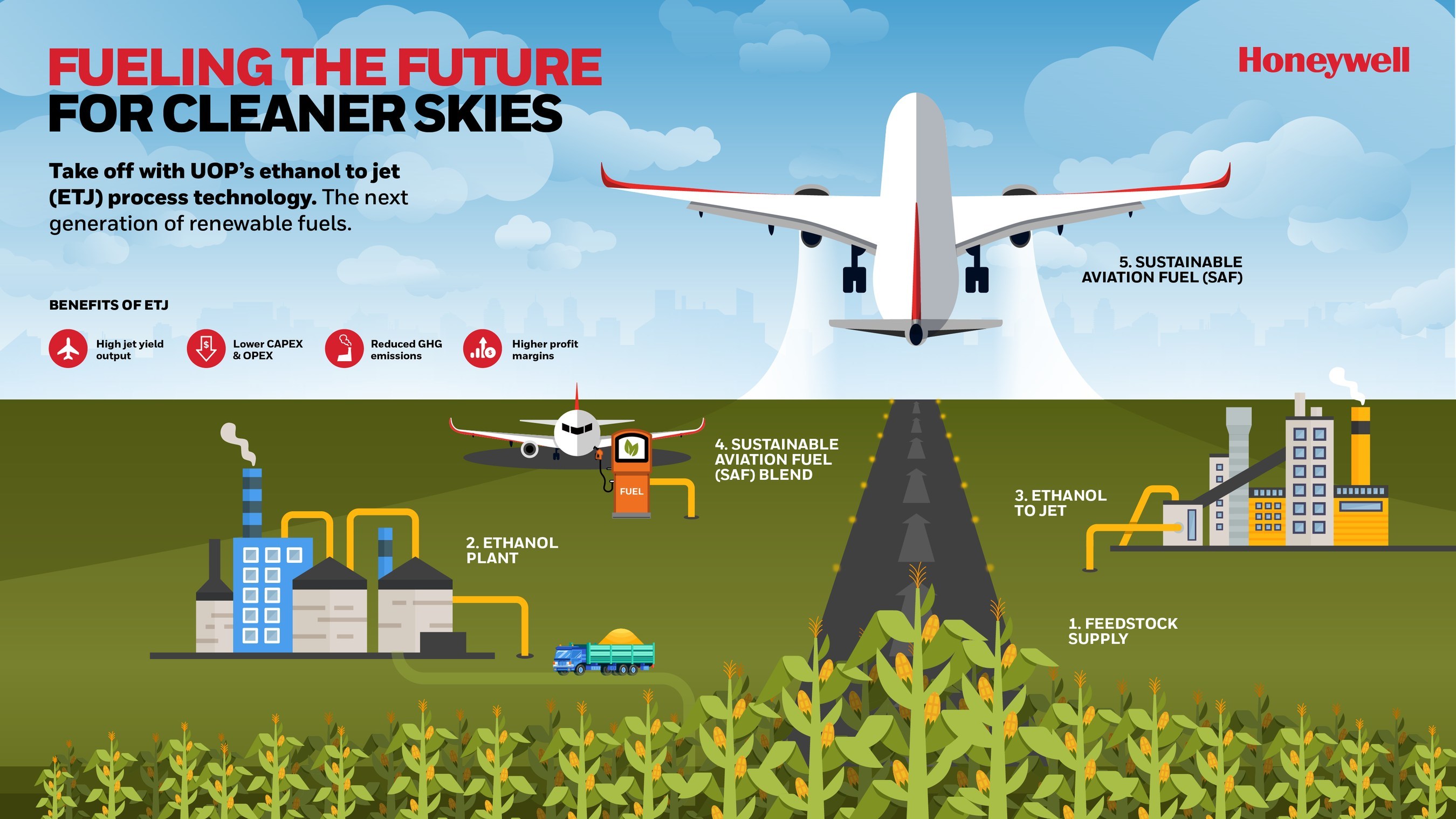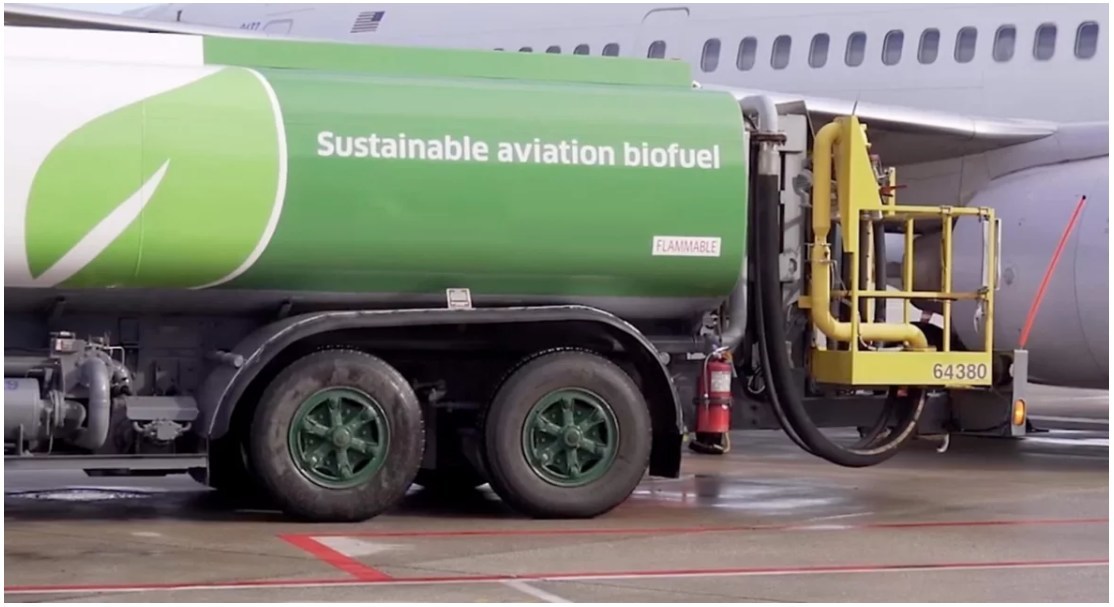
Honeywell Revolutionizes Ethanol-to-jet Fuel Technology to Meet Rising Demand for Sustainable Aviation Fuel
Published by Todd Bush on October 10, 2022
- Honeywell's new solution represents critical development in global drive to meet 2030 sustainable aviation fuel (SAF) mandates
- Provides a cost-effective path for producing lower greenhouse gas emission (GHG) jet fuel from ethanol
- Modular design lowers capital costs and speeds time to first production
CHARLOTTE, N.C., Oct. 10, 2022 /PRNewswire/ -- Honeywell (NASDAQ: HON) today announced a new, innovative ethanol-to-jet fuel (ETJ) processing technology that allows producers to convert corn-based, cellulosic, or sugar-based ethanol into sustainable aviation fuel (SAF). Depending on the type of ethanol feedstock used, jet fuel produced from Honeywell's ethanol-to-jet fuel process can reduce greenhouse gas (GHG) emissions by 80% on a total lifecycle basis, compared to petroleum-based jet fuel.1
>> In Other News: TotalEnergies and Honeywell Sign a Strategic Agreement to Promote the Development of Advanced Plastic Recycling

Demand for SAF continues to grow, yet the aviation industry is challenged by limited supplies of traditional SAF feedstocks such as vegetable oils, animal fats and waste oils. Ethanol offers producers a widely available, economically viable feedstock. Honeywell's ready now technology uses high-performance catalysts and heat management capabilities to maximize production efficiency, resulting in a cost-effective, lower carbon intensity aviation fuel.
A 2021 life-cycle analysis by the U.S. Department of Energy's (DOE) Argonne National Laboratory concluded that ethanol-to-jet fuel conversion, combined with other technologies such as carbon capture and sequestration (CCUS) and smart farming practices, can result in negative GHG emissions compared to petroleum-based jet fuel.2

"Honeywell pioneered SAF production with its Ecofining™ technology, and our new ethanol-to-jet fuel process builds on that original innovation to support the global aviation sector's efforts to reduce GHG emissions and meet SAF production targets with an abundant feedstock like ethanol," said Barry Glickman, vice president and general manager, Honeywell Sustainable Technology Solutions. "Honeywell's ethanol- to-jet process, when used as a standalone or when coupled with Honeywell carbon capture technology, is ready now to provide a pathway to lower carbon-intensity SAF."
SAF plants using Honeywell's technology can be modularized off site enabling lower installed costs and faster, less labor-intensive installation compared to job site construction. By utilizing Honeywell's ETJ technology and an integrated, modular construction approach, producers can build new SAF capacity more than a year faster than is possible with traditional construction approaches.
Petroleum refiners and transportation fuel producers can also benefit from Honeywell's ETJ design that is purpose-built to enable conversion of current or idle facilities into SAF production plants, potentially maximizing use of exiting sites for SAF production to meet the growing market demand.
In 2021, the Biden Administration announced its Sustainable Aviation Fuel (SAF) Grand Challenge for the U.S. aviation fuel supply sector to produce at least three billion gallons of SAF per year by 2030 and reduce emissions from aviation by 20%, with an eventual goal of meeting 100% of U.S. aviation fuel demand with SAF by 2050. Also in 2021, the European Council released its 'Fit for 55' package which aims to increase the share of sustainable fuels at EU airports from a minimum of 2% in 2025 to at least 63% by 2050. These and other incentives, including the Inflation Reduction Act, accelerate the need for alternative SAF feedstocks to meet demand.
Click here to learn more about Honeywell's Ethanol to Jet Technology.
Honeywell is committed to achieving carbon neutrality in its operations and facilities by 2035. This commitment builds on the company's track record of sharply reducing the greenhouse gas intensity of its operations and facilities as well as its decades-long history of innovation to help its customers meet their environmental and social goals. About 60% of Honeywell's new product introduction research and development investment is directed toward products that improve environmental and social outcomes for customers.
>> In Company Spotlight: Honeywell International Inc
About Honeywell
Honeywell (www.honeywell.com) delivers industry-specific solutions that include aerospace products and services; control technologies for buildings and industry; and performance materials globally. Our technologies help aircraft, buildings, manufacturing plants, supply chains, and workers become more connected to make our world smarter, safer, and more sustainable. For more news and information on Honeywell, please visit www.honeywell.com/newsroom.
1 Based on the EPA's summary LCA of GHG emissions for sugarcane.
2 Office of Energy Efficiency & Renewable Energy: Sustainable Aviation Fuels from Low-Carbon Ethanol Production, Oct. 20, 2021, Accessed October 5, 2022
SOURCE Honeywell
Subscribe to the newsletter
Daily decarbonization data and news delivered to your inbox
Follow the money flow of climate, technology, and energy investments to uncover new opportunities and jobs.
Companies
Latest issues
-
This $4.1M Deal Could Change Carbon Capture's Playbook
Inside This Issue 🗜️ CarbonQuest Lands $4.1M Alberta Deal on Gas Compressors 🛡️ CADO, 123Carbon, and Assure SAF Registry Join Forces to Tackle SAF Integrity Gaps ✈️ ISCC, OMV, and Airbus Partner t...
-
Can Koloma Crack Iowa's Billion-Year-Old Secret?
Inside This Issue ⛏️ Iowa's Hydrogen Rush: Can Koloma Strike Gold Before Rules Kick In? ✈️ Bentley Commits to Use 100% Sustainable Aviation Fuel for Car Airfreight 🌬️ Minister Parrott Provides Upd...
-
$47M Just Poured Into This SAF Producer
Inside This Issue 💰 LanzaJet Announces $47M in New Capital and First Close of Equity Round at $650M Pre-Money Valuation 🚢 Maersk's Ethanol Bet Could Reshape U.S. Fuel Markets 🪨 Canada Nickel and t...
Company Announcements
-
Feedstocks are Perennial Grasses and other Renewable Biomass Sources FREDERICK, Md., Feb. 18, 2026 /PRNewswire/ -- Do you know why passenger and freight planes are not using renewable biofuel? It'...
-
Vancouver, British Columbia--(Newsfile Corp. - February 25, 2026) - Q Precious & Battery Metals Corp. (CSE: QMET) (OTC Pink: BTKRF) (FSE: 0NB) ("QMET" or the "Company") congratulates Quebec Inn...
-
Carbon Direct and C2X Announce Collaboration on Pioneering Forestry Residue-to-Biofuel Project
Collaboration on C2X’s Beaver Lake Biofuels project advances biomass carbon removal and storage as a scalable climate solution, transforming Louisiana’s forestry and sawmill residues into biofuel a...
-
Carbon Direct and C2X Announce Collaboration on Pioneering Forestry Residue-to-Biofuel Project
Collaboration on C2X’s Beaver Lake Biofuels project advances biomass carbon removal and storage as a scalable climate solution, transforming Louisiana’s forestry and sawmill residues into biofuel a...